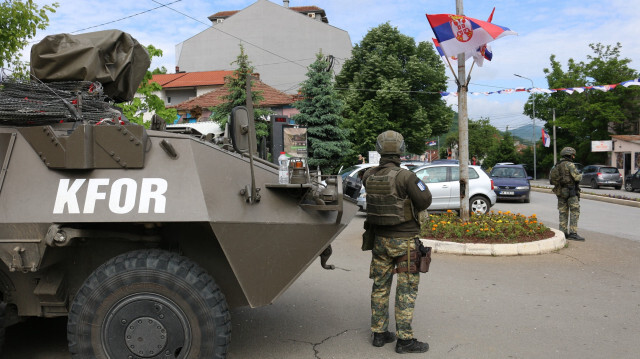
In three questions, Hamza Karcic evaluates the latest tensions in Kosovo, the international community’s reactions and possible future scenarios.
- What caused tension in the region?
The latest cycle of tensions in Kosovo started in late May when Albanian mayors attempted to assume office in four municipalities with an ethnic-Serb majority in the north of the country. The Serbs had boycotted the April elections, resulting in the victory of Albanian candidates. Then, Serb protestors resorted to violence to prevent the newly-elected officials from taking office. This led to clashes between the Serb protestors and the NATO-led international peacekeeping mission in Kosovo (KFOR) troops in the country. As a result, around 30 KFOR soldiers were injured in the clashes.
Observers and analysts in the region concur that Belgrade instigated the tensions in Kosovo. The footage and pictures of injured troops of the NATO-led mission in Kosovo widely reported in the news and on social media have had the effect of humiliating international troops that are part of KFOR.
While the immediate cause is seemingly related to who will wield power in a few municipalities in the north, the real root cause is Belgrade’s unwillingness to recognize the reality of Kosovo’s independence. Instead of pursuing normalization and mutual recognition with Pristina, Belgrade’s policy has been to establish parallel institutions with the objective of projecting its power in this part of Kosovo. For Pristina, this constitutes an unacceptable meddling in Kosovo’s internal affairs.
- What were the reactions?
After its soldiers were injured, NATO pledged to send in an additional 700 troops to Kosovo. This decision on deploying commandos will boost the KFOR presence in Kosovo, which is currently estimated at around 3,800 troops from 27 countries.
Türkiye will be sending its commandos to the country. This represents an important message from Türkiye about its commitment to peace in the Balkans. Türkiye’s decision was welcomed in the region as an important step towards calming the situation. Türkiye is well-positioned to play a mediator role to ease tensions and is a crucial voice in NATO that can advocate for Kosovo’s membership in the Alliance.
A number of Western officials unfairly blamed Kosovo’s leadership, and particularly prime minister Albin Kurti, for the latest flare-up in this part of the Balkans. In fact, Pristina’s response was to exercise sovereignty over a part of its own territory.
To observers in the Balkans, it is unfathomable that international condemnation of the violence was directed at Pristina and not Belgrade. Faced with increasing demonstrations against his rule at home, Serbia’s president Aleksandar Vucic conveniently sought to divert attention by positioning himself in the current flare-up, once again, as a "defender of Kosovo's Serbs."
- What could the future scenarios be?
Tensions in Kosovo escalate every couple of months in a pattern. Last summer, there was a crisis over IDs and license plates. A few months ago, in December, ethnic Serbs put up roadblocks in the northern part of Kosovo. If the current tensions subside, it is likely that a flare-up will ensue again this year, as it has several times over the last year. In fact, Kosovo has elements of a frozen conflict with the potential to flare up as a result of an escalation of tensions.
A major strategic mistake now would be to attempt to resolve the current tensions by pushing for counterproductive fixes. If the West insists on the formation of an Association of Serb Municipalities in Kosovo, this would be an example of a mistake that would only compound the existing challenges. The formation of such an association would, in effect, be the establishment of a Republika Srpska (RS)-type entity in Kosovo, which would turn out to be a recipe for long-term instability.
The way forward is for NATO to beef up its presence in Kosovo. Apart from this immediate response, Kosovo’s NATO membership should now be a priority. At this stage, it is unlikely that Kosovo will join the United Nations (UN) or the European Union (EU) anytime soon. Hence, membership in NATO would provide a security umbrella for Kosovo and help prevent the Balkans from becoming the powder keg of Europe again.

